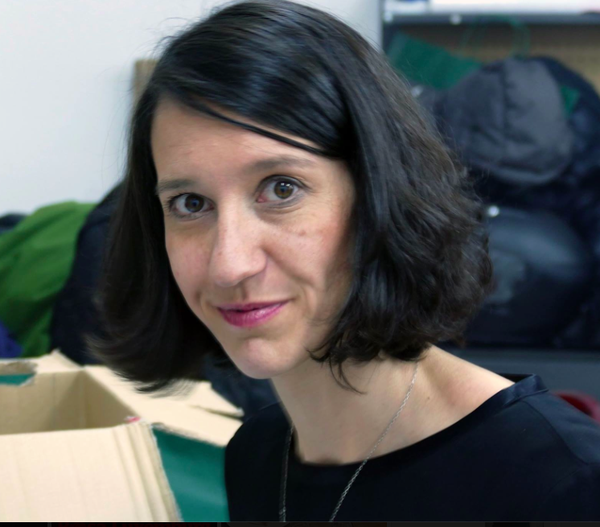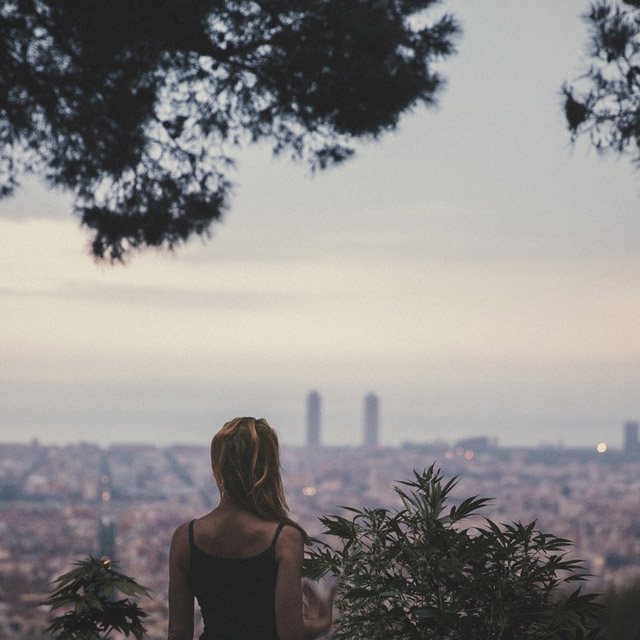- Carola is the director of the Dos Emociones (Two Emotions) project and of the Spanish Observatory of Medicinal Cannabis, two pioneering organisations in Spain fighting for the regulation of medicinal cannabis and for the improvement of the quality of healthcare.
- Behind these two ambitious projects, which are currently spearheading a renewed movement for the regulation of therapeutic cannabis, is Carola's personal story. The story of a struggle and of personal achievement which, in the purest style of the "butterfly effect", triggered these two projects.
- Carola has been able to transform an unfortunate accident and all the suffering it has caused into two initiatives that are now actively contributing towards improving the lives of many patients. We wanted to interview her to learn about how it all started, when and how the flutter of the butterfly's wings that would cause an earthquake years later came to be.

When Carola was a child she liked to skate. It was while practising this sport that she broke her coccyx in a fall when she was just eleven years old. Since then, and until she was 18, doctors tried to solve this problem with all kinds of treatments without achieving any satisfactory results. The pain was very intense and prevented her from sitting down and from living her day-to-day life normally. When she was eighteen, Carola went through her first surgical operation to remove her coccyx. During this procedure, the nerves of Carola's spinal cord were damaged, which since then has led to daily chronic neuropathic pain with an intensity of 8/10.
What is it like to live in constant pain?
It's awful, terrible. To alleviate the pain, the doctors prescribed very strong drugs, including morphine. I came very close to losing my life. When I was operated on for the first time I was 18; now I'm 37 and I've gone through surgery 12 times.
I even asked my parents to help me die. When you use morphine continuously at such high doses, apart from creating a strong addiction, it creates other types of problems; for example, bringing on depression. I can hardly remember anything from those years when I was taking morphine. It got to a point where I started to lose mobility and couldn't continue with my normal life. The more I rested and the more medication I took, the more the loss of muscle mass; it became a vicious circle.
How is it possible to be prescribed a morphine-based chronic treatment?
This is something that happens every day and which should be a crime, where such strong substances like morphine are prescribed for chronic pain. The patient receives a brutal amount of opiates, totally incompatible with a long-term treatment and much less with carrying out day-to-day activities.
In cases like mine, where the pain is for the rest of your life, you have to look for treatments that are compatible. Morphine is fine as a short-term rescue, as a post-surgical or palliative treatment, but you can't hook me to morphine at the age of 20. It's not a solution.
When I was operated on for the first time I was 18; now I'm 37 and I've gone through surgery 12 times.
How did you manage to escape from that spiral?
It was the doctors themselves who realised that they had gone too far with the dosage and they told me to go through a detox treatment. I had to go and spend three months at the seaside, with my parents, suffering the cravings by myself, with the guidance of a psychiatrist. I went through hell.
What happened afterwards?
I searched for alternatives and that's when I discovered cannabis and my life changed radically. When I managed to wean off that huge amount of drugs with the help of psychiatrists, I found that I needed something to relieve me and help me to eat, because when you're in such pain you can't even feed yourself.
Cannabis works for me and it's very different to anything I've tried, it helps me get through the day: it opens my appetite, improves my mood, it helps me sleep and even slightly alleviates the pain. Since I started my cannabis treatment I've managed to cut down the number of pills I take from 19 to 2 a day.
Was it easy to access medicinal cannabis?
Well, it was a long process. I started by looking for cannabis in the black market, but the experience was terrible; there were no guarantees that what they were selling me was what I needed. In illegal distribution networks you never know what you're buying, whether the marijuana is indica, sativa, the amount of cannabinoids it contains, and it is often contaminated with fungi, etc.
The next step was to join a cannabis club, and things improved then, because I knew I could have certain guarantees regarding the product.
Do you think that there is a lot of disinformation regarding cannabis? Why?
Yes, a lot. There's a lot of information out there on the Internet that has no scientific basis and there are very few reliable information channels created by experts; this is one of the reasons that led me to found Dos Emociones.
We find ourselves facing this big paradox where doctors themselves are unaware of the medicinal properties of cannabis, because it's not something they study at university. What I can't understand is why medical students are not taught about the endocannabinoid system that every person has. It's something that's very important for the correct functioning of our organism, leaving aside the consumption of cannabis. The problem is at the top, with a lack of information for healthcare staff.
CBD is a great ally at all levels, it is a silent palliative.
This was one of the reasons why I founded Dos Emociones, I'm young, I'm 37 years old and I think that I deserve, along with other patients, to have the best quality of life possible given the circumstances. In my case cannabis is a huge ally to achieve this.
Do you know about the new CBD-rich varieties?
Yes, and I think that the fact that CBD-rich varieties are being launched to the market is great news. As a patient they work very well for me. In clubs, for example, their varieties normally have a lot of THC and little CBD, so it's important to have these type of seeds in the market so that patients can grow their own plants. CBD is a great ally at all levels, it is a silent palliative without psychoactive effects but which works very well as an anxiolytic, anti-inflammatory, antitumoral, etc.
Do you think the fact that cannabis is not regulated is dangerous for patients? Do you think that because of it being in the black market it could contain traces of chemical products that are health hazards?
Right now, in the black market, the user has no guarantee that the product they are buying is of quality and safe. We don't know whether the marijuana we are buying contains harmful chemical products, pesticides or fungi. It's very important for medicinal cannabis products to be as safe and traceable as possible.
If I had discovered cannabis sooner, I would have saved myself ten operations.
Do you think that the health system would improve qualitatively with the regulation of cannabis?
Yes, and what's more, it has been proven to be the case. As soon as the patient experiences an improvement, they logically require less medical attention, they take less medication and their mood improves. This means huge savings in healthcare, in both medicines and in procedures. If I had discovered cannabis sooner, I would have saved myself ten back operations, with the economic cost that entails.
There is a huge difference between Spain and other countries. I travelled to Colorado and I saw their situation, where there's a wide range of medicinal cannabis products: transdermal patches, chocolate bars that specify the percentages of their THC and CBD content, vaporiser cartridges… There's a fantastic medicinal cannabis market because it's regulated. In Spain we're still living in the stone age in this aspect.
It's paradoxical; Spain, a country with one of Europe's highest consumption rates has such a lack of cannabis regulation…
Yes, and in the end it's the user who loses out. Because they don't have safe access. I think the solution requires political will to solve the situation, they need to sit down and talk and create a regulatory framework. And it's also very important for healthcare professionals to receive proper training in the subject. If doctors don't know what cannabis is, how it's used, if they don't know what the endocannabinoid system is, the contraindications, we won't be able to do much in the way of treatment.



Comments from our readers
There are no comments yet. Would you like to be the first?
Leave a comment!Did you like this post?
Your opinion about our seeds is very important to us and can help other users a lot (your email address won't be made public).